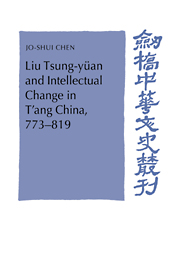Book contents
- Frontmatter
- Contents
- Acknowledgments
- Maps
- Chronology
- Abbreviations
- Introduction
- 1 Literati and thought in the early and middle T'ang
- 2 Liu Tsung-yüan and the circumstances of Ch'ang-an
- 3 805: The abortive reform
- 4 Declaration of principles: Tao and antiquity
- 5 Heaven, the supernatural, and Tao
- 6 Literary theory, canonical studies, and beyond
- 7 Sources of Liu's Confucian thought
- 8 The private sphere
- Conclusion
- Glossary
- Bibliography
- Index
4 - Declaration of principles: Tao and antiquity
Published online by Cambridge University Press: 07 October 2009
- Frontmatter
- Contents
- Acknowledgments
- Maps
- Chronology
- Abbreviations
- Introduction
- 1 Literati and thought in the early and middle T'ang
- 2 Liu Tsung-yüan and the circumstances of Ch'ang-an
- 3 805: The abortive reform
- 4 Declaration of principles: Tao and antiquity
- 5 Heaven, the supernatural, and Tao
- 6 Literary theory, canonical studies, and beyond
- 7 Sources of Liu's Confucian thought
- 8 The private sphere
- Conclusion
- Glossary
- Bibliography
- Index
Summary
In the ninth month, 805, Liu Tsung-yüan was banished from the capital and made prefect of Shao-chou (in present central Hunan). While he was on his way to Shao-chou, the court increased the severity of its punishment of the Wang clique members, reassigning Liu farther south, to Yung-chou (in southern Hunan), and demoting him to marshal (ssuma). He stayed in Yung-chou for ten years. In early 815, after being back in Ch'ang-an, through the court's recall, for less than two months, he received yet another punitive appointment. This time he went farther down to the utmost southwest, to Liu-chou (in present Kwangsi), as prefect, and died there five years afterward. In the eyes of Liu and of contemporary intellectuals on the whole, both Yung-chou and Liu-chou belonged to the “barbarous areas.”.
Accompanied by his mother and her nephew Lu Tsun, Liu Tsung-yüan arrived in Yung-chou at the end of 805. Life in Yung-chou for Liu was in general lonely, painful, and boring. His elderly mother died in the fifth month of 806; he felt deeply guilty about the suffering his political fall brought on her. Having long been widowed, Liu was unable to find an appropriate marriage partner because Yung-chou's literati class was small and the available families did not want to marry their daughters to, as Liu himself put it, “a convict.” More important, Liu had no sons.
- Type
- Chapter
- Information
- Publisher: Cambridge University PressPrint publication year: 1992



